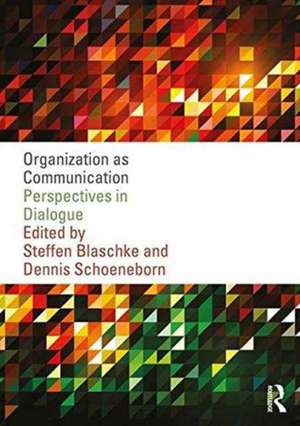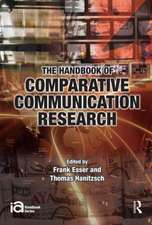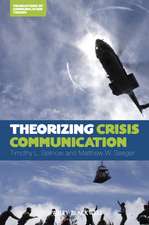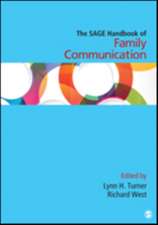Organization as Communication: Perspectives in Dialogue
Editat de Steffen Blaschke, Dennis Schoenebornen Limba Engleză Paperback – 13 dec 2016
The chapters are set into dialogue with some of the most prominent proponents of CCO scholarship. The book offers an important contribution to CCO thinking by adding European perspectives on organization as communication. It connects the primarily North American approach and European traditions of theoretical thought to existing debates in communication and organization studies.
| Toate formatele și edițiile | Preț | Express |
|---|---|---|
| Paperback (1) | 324.16 lei 6-8 săpt. | |
| Taylor & Francis – 13 dec 2016 | 324.16 lei 6-8 săpt. | |
| Hardback (1) | 1045.00 lei 6-8 săpt. | |
| Taylor & Francis – 27 dec 2016 | 1045.00 lei 6-8 săpt. |
Preț: 324.16 lei
Preț vechi: 416.92 lei
-22% Nou
Puncte Express: 486
Preț estimativ în valută:
62.04€ • 64.53$ • 51.99£
62.04€ • 64.53$ • 51.99£
Carte tipărită la comandă
Livrare economică 13-27 martie
Preluare comenzi: 021 569.72.76
Specificații
ISBN-13: 9781138651630
ISBN-10: 113865163X
Pagini: 256
Dimensiuni: 174 x 246 x 26 mm
Greutate: 0.45 kg
Ediția:1
Editura: Taylor & Francis
Colecția Routledge
Locul publicării:Oxford, United Kingdom
ISBN-10: 113865163X
Pagini: 256
Dimensiuni: 174 x 246 x 26 mm
Greutate: 0.45 kg
Ediția:1
Editura: Taylor & Francis
Colecția Routledge
Locul publicării:Oxford, United Kingdom
Public țintă
UndergraduateCuprins
I Organization as Communication in the Light of Other Theories
II Organization as Communication and Related Concepts: Institutions, Routines, Leadership
III Organization as Strategic Versus Emergent Communication
Contributors
Andreas Georg Scherer
Andreas Rasche
Gabriele Faßauer
Till Jansen
Francois Cooren
Swaran Sandhu
Daniel Geiger
Anja Schröder
Jochen Koch
Timothy Kuhn
Peter Winkler
Stefan Wehmeier
Anne Marie Lohuis
Mark van Vuuren
Joep Cornelissen
Linda Putnam
II Organization as Communication and Related Concepts: Institutions, Routines, Leadership
III Organization as Strategic Versus Emergent Communication
Contributors
Andreas Georg Scherer
Andreas Rasche
Gabriele Faßauer
Till Jansen
Francois Cooren
Swaran Sandhu
Daniel Geiger
Anja Schröder
Jochen Koch
Timothy Kuhn
Peter Winkler
Stefan Wehmeier
Anne Marie Lohuis
Mark van Vuuren
Joep Cornelissen
Linda Putnam
Notă biografică
Steffen Blaschke is Associate Professor in Organizational Communication at the Copenhagen Business School in Denmark. His current research focuses on methods and measures of organizational communication. His research has been published in the Journal of Management Inquiry, Management Communication Quarterly, and Organization Studies, among others.
Dennis Schoeneborn is Professor (MSO) of Communication, Organization, and Corporate Social Responsibility (CSR) at the Copenhagen Business School in Denmark. His current research focuses on how communicative practices constitute new and fluid forms of organizing. His research has been published in the Academy of Management Review, Human Relations, Journal of Management Studies, Management Communication Quarterly, and Organization Studies, among others.
Dennis Schoeneborn is Professor (MSO) of Communication, Organization, and Corporate Social Responsibility (CSR) at the Copenhagen Business School in Denmark. His current research focuses on how communicative practices constitute new and fluid forms of organizing. His research has been published in the Academy of Management Review, Human Relations, Journal of Management Studies, Management Communication Quarterly, and Organization Studies, among others.
Descriere
The idea that communication constitutes organization (CCO) provides a unique perspective to organization studies by highlighting the fundamental and formative role of communication for organizational phenomena of various kinds. The book features original works that address the idea of organization as communication in the light of other theories, related concepts, as well as the tension between strategy and emergence. The first set of chapters discusses the idea of organization communication in the light of critical works of European scholars (Habermas, Honneth, and Günther). The second set of chapters reflects on a range of concepts such as institutions, routines, and leadership from a CCO perspective. The final set of chapters examines the tension between strategic and emergent communication by drawing on new methodology and empirical evidence.












